IWD 2024 | Interview with Prof. Jun Yang

Which woman has most inspired you in your life?
I grew up with a portrait of Marie Skłodowska Curie in many of my classrooms. She was the first woman to win the Nobel Prize, the first two-time winner of the Prize, and the only person to win the Prize in two different scientific fields. I have always been fascinated by her intelligence and dedication to science. Her work transformed medical diagnosis through the application of radioactivity.
What is the state of women’s representation in scholastic leadership positions?
Women’s representation in scholastic leadership positions has significantly improved in the past ten years. For example, since 1965, only five of the 58 Western Finance Association (WFA) presidents have been women, but four of the five served in the last ten years. The current president-elect is also a woman.
Woman scholars’ representation appears to be in line to the fraction of women among finance scholars, which is under 20% according to the 2022 survey by the Academic Female Finance Committee (AFFECT). As of February 29, 2024, women comprise:
- 25% of the editorial boards of the top three finance journals (Journal of Finance, Journal of Financial Economics, and Review of Financial Studies), with RFS leading in representation of women.
- 20% of the NBER Corporate Finance affiliated scholars, the area for most corporate governance research.
- 25% of ECGI research members, with greater representation among newly elected members.
However, these impressive numbers of women’s representation can be misleading, as a small number of highly established women occupy most of these leadership positions—a concerningly high concentration. We still have far to go in broadening access to leadership positions, as well as ushering more women scholars into the field.
What is the state of women’s representation in administrative positions?
Women’s representation in administrative leadership positions presents a more heterogeneous picture across business school rankings and leadership levels. The following table shows the percentages of women in three top leadership positions as of February 29, 2024. (Business school rankings are based on the 2023-2024 U.S News and World Report).[1]
Percentage of Female University Presidents
Percentage of Female B-School Deans
Percentage of Finance Department Chairs/ Area Coordinators
Top 20 B-Schools
35%
35%
6%
101-120 ranked B-Schools
5%
35%
39%
Big Ten B-Schools[2]
43%
43%
29%
Women’s representation is encouraging among business school deans in all three groups. The top 20 group has good women’s representation among university presidents, but there is room for improvement earlier in the pipeline. By comparison, the middle-ranked group has more women among finance chairs and area coordinators but is lagging among top university leaders. Most noticeably, the Big Ten group is doing well in women’s representation across all three leadership levels.
How can academic institutions foster gender diversity in scholarship and leadership roles?
The clustering of a small number of superwomen in leadership positions creates a supply problem in the long run. Universities and professional associations should actively recruit, develop, and promote female scholars (starting with recruiting doctoral students and junior scholars). AFFECT’s mentoring workshops, office hours with senior women in finance, and fireside chats with journal editors are good examples of how to do this. Universities and business schools could organise similar programs. For example, Indiana University already has women’s leadership programs in place.
What have I done to foster gender diversity?
As the Director of the Institute for Corporate Governance (Kelley ICG) and the chairperson of the Finance Department at Kelley School of Business, Indiana University, I have overseen the following initiatives:
- I launched Kelley ICG public lectures on corporate governance in collaboration with the ECGI and IU Ostrom Workshop. Women were represented at 50% of our 22 lectures and comprised 42.3% of our 26 speakers.
- I now lead the Kelley Finance department of 32 tenure-track faculty members, including five women (15.6%). We are still recovering from losing three established female scholars since 2020. On the positive side, Kelley Finance has three women among our full professors (30%). This fraction was 12.5% a year ago when I was the only woman in the full rank.
What suggestions do you have for women scholars in corporate governance?
- Establish your research reputation early in your career. Publishing corporate governance research is extremely challenging given the inherently endogenous nature of governance-related issues.
- Seek academic mentors via conference interactions (with discussants or perhaps presenters), journal review processes (with editors), as well as newly created mentoring programs.
- Craft a network of knowledgeable practitioners (e.g., top executives, corporate board members, and compensation consultants for governance scholars) and proactive, reliable journalists. Through these connections, one may find original ideas about critical issues.
What suggestions do you have for women aspiring to take leadership responsibilities?
- Perfect work-life balance does not exist. Good-enough work-life balance calls for a constantly evolving network of personal and professional support.
- Embrace challenging opportunities. Venture out of your comfort zone and say “Yes.” You are good enough for most of the professional responsibilities you feel unsure about.
- Draw your boundaries and control your own calendar when you take on your first administrative position.
- “Find your north star,” said Feifei Li, the godmother of Artificial Intelligence (AI). Be brave and enjoy the journey.
Happy International Women’s Day!
[1] 2023-2024 Best Business Schools (MBA) - US News Rankings
[2] Big Ten Conference - Wikipedia
Jun Yang is a Conrad Prebys Professor of Finance and Chairperson of the department of Finance at Kelley School of Business, Indiana University. She also serves as the Director of the Institute for Corporate Governance (Kelley ICG) and an ECGI research member. Her research focuses on corporate finance, corporate governance, executive compensation, and FinTech. Her work investigates opportunistic managerial behavior related to compensation peer benchmarking, executive pensions, and various factors that may affect the nature of director independence.
Continue reading in this collection: